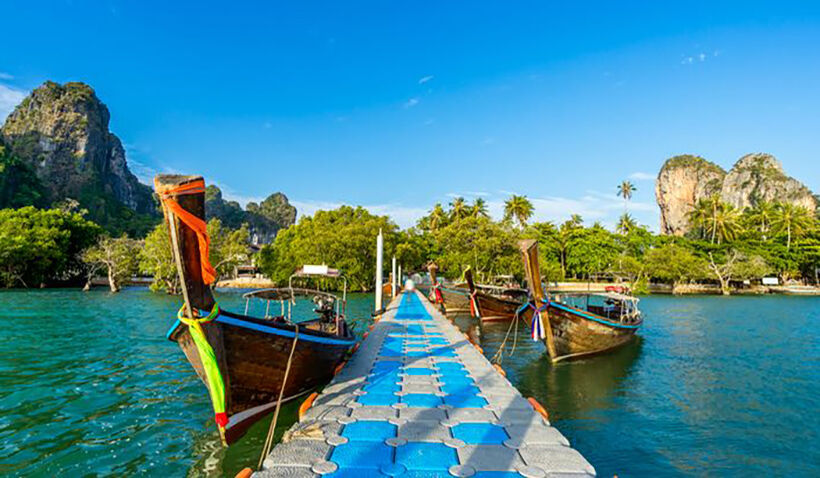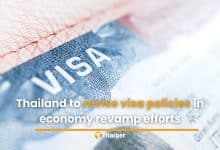Travelling to Thailand right now (April edition)

Finding information about traveling to Thailand at this time can be a bit confusing. Suddenly there’s a lot more paperwork and the Thai government keep updating the situation. But the good news is that the Thai government have at least put out a 4-part plan to totally re-open the country by the end of 2021/start of 2022. You also need to work through the vagaries of individual embassies and staff who may sometimes have different interpretations of the latest guidelines. But everyone is trying their best to help you get back to Thailand… so your patience will be rewarded.
For now, you need to consider a few more things than in the past, including the situation in your own country and getting back home after your visit to the Land of Smiles. Currently there are many countries that require quarantine to get back in.
The Thai Government has now endorsed issuing a Covid-19 vaccination certificate in the kingdom (for people having the required doses of approved vaccines), while approving shorter quarantine periods for international arrivals. Both measures take effect from April 1 until further notice.
There is also a current variant of Covid-19 which is causing havoc in some countries and could potentially de-rail the best laid plans.
More re-entry information HERE.
Will I need a visa?
Here’s a list of countries that, as of April 1, do not require a visa for a stay of up to 45 days in Thailand. They are part of the Visa exemption scheme.
Andora, Australia, Austria, Bahrain, Belgium, Brazil, Brunei Darussalam, Canada, Czech Republic, Denmark, Estonia, Finland, France, Germany, Greece, Hong Kong, Hungary, Iceland, Indonesia, Ireland, Israel, Italy, Japan, Korea, Kuwait, Latvia, Liechtenstein. Lithuania, Luxembourg, Malaysia, Maldives, Mauritius, Monaco, Netherlands, New Zealand, Norway, Oman, Peru, Philippines, Poland, Portugal, Qatar, San Marino, Singapore, Slovakia, Slovenia, Spain, South Africa, Sweden, Switzerland, Ukraine, Sweden, UAE, UK, USA, Vietnam.
Travellers from other countries – Laos, Macau, Mongolia and Russia – can also stay for 45 days under long-standing relationships whilst travellers from Argentina, Brazil, Chile, Korea and Peru can stay for up to 90 days.
If you’re not on the list you can apply for a Special Tourist Visa. This allows travellers to enter for a maximum of 90 days, and can be extended for another 90 days, twice, but the STV plan finishes in September this year so you would need to apply before then. Any other visa type will need to be individually discussed with your embassy if your circumstances are exceptional.
The TAT has published this list of 11 different groups that can enter Thailand from April 1…
(1) Thai nationals.
(2) Persons with exemption or persons being considered, permitted or invited by the Prime Minister, or the head of responsible persons accountable for resolving state of emergency issues to enter the Kingdom, pertaining to necessity. Such consideration, permission, or invitation may be subject to specific conditions and time limits.
(3) Persons on diplomatic or consular missions or under International organisations, or representatives of foreign governments performing their duties in the Kingdom, or persons of other international agencies as permitted by the Ministry of Foreign Affairs pertaining to necessity, including their spouse, parents, or children.
(4) Carriers of necessary goods, subject to immediate return after completion.
(5) Crew members who are required to travel into the Kingdom on a mission, and have a specific date and time for return.
(6) Non-Thai nationals who are spouses, parents, or children of Thai nationals.
(7) Non-Thai nationals who hold a Certificate of Residence, including their spouses and children.
(9) Non-Thai nationals who are students of educational institutions approved by Thai authorities, including their parents or guardians, excluding students of non-formal educational institutions in accordance with the law on private schools, and of other similar private educational institutions.
(10) Non-Thai nationals who are in need of medical treatment in Thailand, and their accompanying persons. However, this shall not include medical treatment for Covid–19.
(11) Non-Thai nationals who have been granted permission to enter into the Kingdom under special arrangements between Thai government agencies and other countries, or persons or groups of persons who have been granted permission by the Prime Minister upon the submission for consider after the examination and review by the Ad Hoc Committee for the Consideration of the Relaxation of the Enforcement of Measures to Present and Suppress the Spread of the Communicable Disease Coronavirus 2019 (Covid-19), and shall comply with disease prevention measures determined by the Ad Hoc Committee.
Quarantine
From April 1 the quarantine time has been reduced. Unless you’re arriving from a country where mutated strains of Covid are currently a problem.
“Quarantine will be reduced to 7 days for international arrivals who have been fully vaccinated against COVID-19 with a vaccine, approved, and registered with the MoPH or approved by the WHO, no less than 14 days before the travelling date. However, they must be from countries with no mutated strain of SAR-CoV-2 virus as announced and constantly updated by the MoPH.”
Currently that includes many countries on the African continent. The Thai government will allow a quarantine of only 7 days for vaccinated travellers but only for people vaccinated within three months of travel.
In all cases you will need to have pre-booked and paid for your quarantine at a registered ASQ facility before you leave for Thailand. After July there are a couple of zones piloting a ‘Sandbox’ plan, including Phuket and Koh Samui, which won’t require any quarantine for foreigners who carry a proof of vaccine (although the zones have to meet certain criteria regarding vaccination of local populations before the ‘sandbox’ is permitted).
Insurance
At this time there is still a requirement to purchase a special insurance against your catching Covid-19 with a value of at least US$ 100,000. Your embassy can provide you with a list of insurance companies providing this type of insurance at the moment. Your general travel insurance will not cover this.
Insurance information HERE.
Certificate of Entry
Anyone traveling to Thailand at this time must apply for a Certificate of Entry, including Thais. You can apply for the certificate online. Travellers will have to upload documents including a copy of your passport, a copy of you visa if required, and a copy of your insurance policy. Once pre-approved, you can buy your flights and then upload a copy of the flight tickets and ASQ booking confirmation with the hotel. Once your application in approved, you can download your Certificate of Entry.
Fit To Fly Certificate and Covid test
The fit to fly certificate from a doctor has been waived after April 1, although you should double check with your embassy if there is still a requirement for your country. You will also need a negative Covid-19 test result.
Check list
So, before you head for the airport, check that you have everything…. Your passport, certificate of entry, Covid insurance policy, your normal travel insurance (advised but not compulsory), a confirmed ASQ booking and a return flight booking, unless you intend to apply for a different visa when you arrive in Thailand.
Arrival
Once you arrive in Thailand you will undergo another Covid-19 test before being taken directly to your ASQ hotel for mandatory quarantine (sometimes this test happens at the ASQ facility). You will be tested twice during your quarantine period (but some travellers report different schedules to this), and then free travel around Thailand is allowed at the end of your quarantine period.
Re-opening Thailand
From July the government is trialling a pilot program where they will allow people to arrive without any quarantine – currently to Phuket and other hard-hit tourist areas. If all goes well, the intention is to have Thailand mostly re-opened by October. BUT we should also realise that there are still many variables at play and any of these plans and dates may change. We’d recommend you keep following thethaiger.com for all the latest information about travel to Thailand.
We’d also recommend contacting your embassy for any of the latest information about formalities if you wish to travel to Thailand right now before injuring expenses like booking flights or your ASQ.
Latest Thailand News
Follow The Thaiger on Google News:


























